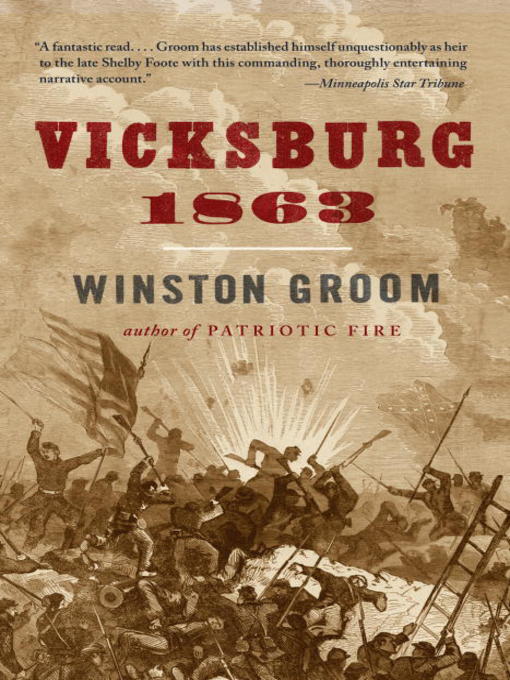
Vicksburg, 1863
کتاب های مرتبط
- اطلاعات
- نقد و بررسی
- دیدگاه کاربران
نقد و بررسی

January 26, 2009
Groom’s approach to the Civil War follows the examples of Bruce Catton and Shelby Foote. It features learning lightly worn presented in a narrative format that engages even though the outcome is known. Groom’s conclusion that the Confederacy was best advised to seek terms after Vicksburg’s fall sealed the rebels’ fate is reasonable. But it is eclipsed by his compelling depiction of two improvised armies, each fighting, in James McPherson’s words, “for cause and comrades.” Both had to learn the craft of war, and blood was the price of ignorance. Personalities like William Tecumseh Sherman and John Pemberton, the Confederate general from Pennsylvania, vie for place with Benjamin Grierson’s dramatic cavalry raid through Mississippi and the death grapple of Union and Confederate Missourians at Vicksburg. Grant, however, remains the central figure. His approach was a combination of improvisations. If something failed, like the costly attack on Chickasaw Bluffs, he tried something else until he finally put in place the siege that decided the Civil War. Groom presents grand events from a human perspective, introducing a spectrum of colorful characters. Maps.

February 15, 2009
Novelist and historian Groom (Patriotic Fire: Andrew Jackson and Jean Laffite at the Battle of New Orleans, 2006, etc.) recalls the Union's campaign against Vicksburg, Miss.,"the Gibraltar of the West."
Military historians well understand Vicksburg's strategic importance. Its capture allowed the"Father of Waters" to flow once more, in Lincoln's felicitous phrase,"unvexed to the sea," shearing the Confederacy in half and all but assuring its eventual defeat. Moreover, Vicksburg forever elevated"Unconditional Surrender" Grant who, notwithstanding his success at Fort Donelson, was under fire in the North as a blunderer and a drunk. (Groom offers convincing proof that Grant went on a bender during the siege.) The battle demonstrated his foremost virtue as a commander, the tenacity that would eventually subdue Robert E. Lee a year and a half later at Appomattox."I can't spare this man," said Lincoln,"he fights." In meticulous but never tiresome detail, Groom follows the protracted fighting, highlighting the roles of Confederates Jefferson Davis, Earl Van Dorn, Joseph E. Johnston, John Pemberton and Nathan Bedford Forrest, the Union's troublesome political generals Nathaniel Prentice Banks and John Alexander McClernand, the feckless general-in-chief Henry Halleck and, above all, Grant and his indispensable subordinates James B. McPherson and William Tecumseh Sherman. The author makes liberal use of diaries, letters and histories authored by the soldiers who fought and, most memorably, by the civilians who suffered the withering assault on the fortress city. By the end, the starving populace was reduced to living in cave shelters, rat-holes from which they emerged on July 4, 1863, when Pemberton finally surrendered the city to the"not easily discouraged" Grant. The South never recovered.
Vivid Civil War storytelling in the tradition of Shelby Foote.
(COPYRIGHT (2009) KIRKUS REVIEWS/NIELSEN BUSINESS MEDIA, INC. ALL RIGHTS RESERVED.)

March 1, 2009
Groom ("1942: The Year That Tried Men's Souls"), a superb storyteller most famous for his novel "Forrest Gump", seems to have researched his topic well, so it's a real disservice that his book lacks footnotes or endnotes or even a full bibliography. His thesis is that the Battle of Vicksburg was strategically the Civil War's most important one, at the end of which the Confederacy could not win the war and was foolish to fight on. The book's greatest strength is that, instead of getting bogged down in the minutiae, it places the battle within the context of the western theater of the war, emphasizing the personalities behind the battles rather than tactics and logistics. This approach makes the book accessible to general readers less familiar with Civil War history. Many will disagree with some of Groom's political conclusions, which show a bias toward the Southern cause; he does seem prone to offering opinion without evidence. There's no shortage of books on this battle, so librarians may choose to skip Groom's, especially if they have Michael Ballard's "Vicksburg: The Campaign That Opened the Mississippi". However, "Vicksburg, 1863" is engaging, and many will find it an enjoyable read. Recommended for public libraries. [See Prepub Alert, "LJ" 12/08.]Michael Farrell, Reformed Theological Seminary. Lib., Oviedo, FL
Copyright 2009 Library Journal, LLC Used with permission.

Starred review from March 1, 2009
Among the most visited of Civil War battlefields, Vicksburg here receives a narrative equal to its significance and popular interest. Though Vicksburg was obviously the strategic key to control of the Mississippi River, it was anything but clear how to unlock the place or to keep it locked. The military difficulties its geography presented to both attacker and defender underlie a perceptiveness present throughout Grooms account: he grasps commanders options, senses the sturdiness of their military character, and dramatizes their choices in a way that awakens the inner armchair general in Civil War readers. Nor does Groom neglect the chain connecting the decisions of strategists to the tumultuous experiences of those on the receiving end, from Union and Confederate soldiers to plantation owners and their slaves. The present-tense flow in Grooms prose enhances vividness, just as it captures the fogginess of war that beset the minds of generals and admirals who conducted the Vicksburg campaigns, of which there were more than half a dozen before Grants victory. A superior example of general-interest Civil War history, this is skillful work by Groom, also the author of several military histories and the novel Forrest Gump (1986).(Reprinted with permission of Booklist, copyright 2009, American Library Association.)

























دیدگاه کاربران